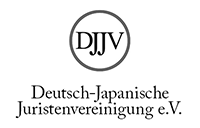Über die Stellung der ausländischen Rechtsanwälte in Japan
Abstract
The regulations on gaikoku-hô jimu bengo-shi (foreign lawyers) set up a system which allows a person who is entitled to practice before the court in another country to take on certain judicial assignments in Japan that involve the law of that country. The per-mission is given without further examination in Japan and is based on the qualification that was obtained in the country that entitled the person to practice before the court (hereafter “country of primary qualification”).
Since about 1977, American and British lawyers have tried to gain a foothold in Japan. They applied for permission from the Japanese Ministry of Justice to get registrations as lawyers settled in Japan and to open law offices there. But the ministry and the Japanese Association of Lawyers (Nichibenren) denied those applications with reference to Art. 72 of the Japanese Lawyer’s Law. In accordance with Art. 72, a person who is not qualified properly cannot work as a practicing lawyer. But foreign countries exerted very strong pressure, which forced the Ministry of Justice and the Nichibenren to relent. Subsequently, a legislative program was started that can be divided into three stages.
First, the gaikoku-hô jimu bengo-shi law was put in force in 1987. Its main contents were the reciprocity principle; the competence of the Nichibenren to register and con-trol the gaikoku-hô jimu bengo-shi; the restriction of the gaikoku-hô jimu bengo-shi’s sphere of activities to matters concerning the law of the country of primary qualification; the interdiction of a permanent employment of Japanese lawyers and of a joint law office with Japanese lawyers; the requirement of a minimum vocational experience of five years; and the prohibition against naming the foreign gaikoku-hô jimu bengo-shi’s office after the foreign law firm.
Second, the law was liberalized in 1995 because of new demands on the part of the U.S. and the EU. Among other innovations, the reciprocity principle was weakened; the requirement of a minimum vocational experience was loosened; the law office could now be named after the foreign law firm, provided that a name annex eliminated the risk of confusion; and specific joint enterprises were admitted as an exception from the interdiction of a permanent employment of Japanese lawyers. A partial audit in 1996 made it possible to authorize gaikoku-hô jimu bengo-shi for international arbitration proceedings in Japan.
Third, a cabinet program aiming at further liberalization led to the reform of 2003. The interdiction of a permanent employment of Japanese lawyers by a gaikoku-hô jimu bengo-shi or his/her shared office was completely abolished. Instead, a gaikoku-hô jimu bengo-shi is not allowed to give operational orders concerning judicial matters outside his/her remit to the Japanese lawyer he/she has employed or works with.
But critics of the reform fear that it will lead to a growing number of Japanese lawyers who belong to a foreign partnership in Japan. Those lawyers might build lobby groups and might, for instance, exert influence on the club rules of the Nichibenren. The author concedes that this development is inevitable, but points out that the exist-ence of lobby groups helps democracy to bind divergent opinions. He also thinks that those lawyers will never constitute the majority of Japanese lawyers, so that an inter-ference in the independence of Japanese law societies is not to be feared.
Another possible consequence pointed out by critics is the rising level of lawyers’ salaries resulting in higher lawyers’ fees. But the author trusts in the stabilization through supply and demand in a competitive market like Japan. In the event of an enormous rise, though, he recommends a legislative limitation.
However, the author shares concerns that the role of lawyers might change. The nature of the profession of a lawyer is seen differently in the U.S. and Japan. An American business lawyer has a very free and creative way of interpreting law. In Japan, however, a lawyer is an independent judicial organ who may not dispose of that independence by crossing the border of formal interpretation of law. That is why, according to the author, the employment of American business lawyers should not prevail.
In general, the situation has improved considerably because of the recognition of gaikoku-hô jimu bengo-shi. In Japan, there is a lack of liaison lawyers. Compared to the U.S., the number of lawyers is very low, both in total numbers (there are 51 times more lawyers in the U.S.) and in relation to the total population (there are 21 times more lawyers in the U.S. per capita). This shortage might be covered by a higher number of gaikoku-hô jimu bengo-shi. The author points out a few aspects that are to be considered. The reciprocity principle should not be acknowledged; the competence of the Nichibenren to register and control the gaikoku-hô jimu bengo-shi is to be guarded; their competence should be restricted to cases that involve the law of the country of primary qualification; and it should be forbidden for foreign lawyers who are not registered with the Nichibenren to take on judicial assignments (misconduct according to Art. 72 Japanese Lawyer’s Law). In order to ensure their necessary qualification, the author recommends that the Nichibenren should make it a condition for registration that foreign lawyers take part in seminaries about the basic principles of Japanese law.
(The Editors)






